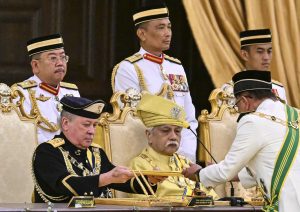The billionaire Sultan who leads Malaysia’s Johor state was sworn in as the country’s new Monarch on Wednesday, following a unique rotating monarchy system.
Sultan Ibrahim Iskandar, 65, took his oath of office at the palace and signed the instrument of proclamation of office in a ceremony attended by other royal families, Prime Minister Anwar Ibrahim, and cabinet officials. A coronation ceremony will take place at a later date.
Sultan Ibrahim, one of the country’s richest men, owns a diverse economic empire that includes real estate, telecommunications, and power plants.
Since Malaysia’s independence from Britain in 1957, nine ethnic Malay state rulers have alternated as king for five-year terms under the world’s only such system. Malaysia has 13 states, but only nine have royal dynasties, some of which are sprung from centuries-old Malay kingdoms that were autonomous until the British brought them together.

Sultan Ibrahim’s ascension to the national throne by his fellow rulers in October was widely anticipated based on a predetermined rotation schedule. Sultan Nazrin, the ruler of Perak state and the next in line to the throne, was re-elected as deputy king.
Sultan Ibrahim succeeded Sultan Abdullah Sultan Ahmad Shah of Pahang state, who presided over a tumultuous period that included COVID-19 lockdowns and political instability.
The political influence of the king has grown in recent years.
Sultan Ibrahim has indicated he will maintain a hands-on approach.
He said in a media interview last month that he would not want to waste five years on the throne as a “puppet king” but will focus on fighting graft and deepening unity in the country.
The sultan and other rulers have also warned against attempts by the opposition to oust Anwar’s government, calling instead for political stability.
The billionaire Sultan who leads Malaysia’s Johor state was sworn in as the country’s new Monarch on Wednesday, following a unique rotating monarchy system.
Sultan Ibrahim Iskandar, 65, took his oath of office at the palace and signed the instrument of proclamation of office in a ceremony attended by other royal families, Prime Minister Anwar Ibrahim, and cabinet officials. A coronation ceremony will take place at a later date.
Sultan Ibrahim, one of the country’s richest men, owns a diverse economic empire that includes real estate, telecommunications, and power plants.
Since Malaysia’s independence from Britain in 1957, nine ethnic Malay state rulers have alternated as king for five-year terms under the world’s only such system. Malaysia has 13 states, but only nine have royal dynasties, some of which are sprung from centuries-old Malay kingdoms that were autonomous until the British brought them together.

Sultan Ibrahim’s ascension to the national throne by his fellow rulers in October was widely anticipated based on a predetermined rotation schedule. Sultan Nazrin, the ruler of Perak state and the next in line to the throne, was re-elected as deputy king.
Sultan Ibrahim succeeded Sultan Abdullah Sultan Ahmad Shah of Pahang state, who presided over a tumultuous period that included COVID-19 lockdowns and political instability.
The political influence of the king has grown in recent years.
Sultan Ibrahim has indicated he will maintain a hands-on approach.
He said in a media interview last month that he would not want to waste five years on the throne as a “puppet king” but will focus on fighting graft and deepening unity in the country.
The sultan and other rulers have also warned against attempts by the opposition to oust Anwar’s government, calling instead for political stability.
The billionaire Sultan who leads Malaysia’s Johor state was sworn in as the country’s new Monarch on Wednesday, following a unique rotating monarchy system.
Sultan Ibrahim Iskandar, 65, took his oath of office at the palace and signed the instrument of proclamation of office in a ceremony attended by other royal families, Prime Minister Anwar Ibrahim, and cabinet officials. A coronation ceremony will take place at a later date.
Sultan Ibrahim, one of the country’s richest men, owns a diverse economic empire that includes real estate, telecommunications, and power plants.
Since Malaysia’s independence from Britain in 1957, nine ethnic Malay state rulers have alternated as king for five-year terms under the world’s only such system. Malaysia has 13 states, but only nine have royal dynasties, some of which are sprung from centuries-old Malay kingdoms that were autonomous until the British brought them together.

Sultan Ibrahim’s ascension to the national throne by his fellow rulers in October was widely anticipated based on a predetermined rotation schedule. Sultan Nazrin, the ruler of Perak state and the next in line to the throne, was re-elected as deputy king.
Sultan Ibrahim succeeded Sultan Abdullah Sultan Ahmad Shah of Pahang state, who presided over a tumultuous period that included COVID-19 lockdowns and political instability.
The political influence of the king has grown in recent years.
Sultan Ibrahim has indicated he will maintain a hands-on approach.
He said in a media interview last month that he would not want to waste five years on the throne as a “puppet king” but will focus on fighting graft and deepening unity in the country.
The sultan and other rulers have also warned against attempts by the opposition to oust Anwar’s government, calling instead for political stability.
The billionaire Sultan who leads Malaysia’s Johor state was sworn in as the country’s new Monarch on Wednesday, following a unique rotating monarchy system.
Sultan Ibrahim Iskandar, 65, took his oath of office at the palace and signed the instrument of proclamation of office in a ceremony attended by other royal families, Prime Minister Anwar Ibrahim, and cabinet officials. A coronation ceremony will take place at a later date.
Sultan Ibrahim, one of the country’s richest men, owns a diverse economic empire that includes real estate, telecommunications, and power plants.
Since Malaysia’s independence from Britain in 1957, nine ethnic Malay state rulers have alternated as king for five-year terms under the world’s only such system. Malaysia has 13 states, but only nine have royal dynasties, some of which are sprung from centuries-old Malay kingdoms that were autonomous until the British brought them together.

Sultan Ibrahim’s ascension to the national throne by his fellow rulers in October was widely anticipated based on a predetermined rotation schedule. Sultan Nazrin, the ruler of Perak state and the next in line to the throne, was re-elected as deputy king.
Sultan Ibrahim succeeded Sultan Abdullah Sultan Ahmad Shah of Pahang state, who presided over a tumultuous period that included COVID-19 lockdowns and political instability.
The political influence of the king has grown in recent years.
Sultan Ibrahim has indicated he will maintain a hands-on approach.
He said in a media interview last month that he would not want to waste five years on the throne as a “puppet king” but will focus on fighting graft and deepening unity in the country.
The sultan and other rulers have also warned against attempts by the opposition to oust Anwar’s government, calling instead for political stability.
The billionaire Sultan who leads Malaysia’s Johor state was sworn in as the country’s new Monarch on Wednesday, following a unique rotating monarchy system.
Sultan Ibrahim Iskandar, 65, took his oath of office at the palace and signed the instrument of proclamation of office in a ceremony attended by other royal families, Prime Minister Anwar Ibrahim, and cabinet officials. A coronation ceremony will take place at a later date.
Sultan Ibrahim, one of the country’s richest men, owns a diverse economic empire that includes real estate, telecommunications, and power plants.
Since Malaysia’s independence from Britain in 1957, nine ethnic Malay state rulers have alternated as king for five-year terms under the world’s only such system. Malaysia has 13 states, but only nine have royal dynasties, some of which are sprung from centuries-old Malay kingdoms that were autonomous until the British brought them together.

Sultan Ibrahim’s ascension to the national throne by his fellow rulers in October was widely anticipated based on a predetermined rotation schedule. Sultan Nazrin, the ruler of Perak state and the next in line to the throne, was re-elected as deputy king.
Sultan Ibrahim succeeded Sultan Abdullah Sultan Ahmad Shah of Pahang state, who presided over a tumultuous period that included COVID-19 lockdowns and political instability.
The political influence of the king has grown in recent years.
Sultan Ibrahim has indicated he will maintain a hands-on approach.
He said in a media interview last month that he would not want to waste five years on the throne as a “puppet king” but will focus on fighting graft and deepening unity in the country.
The sultan and other rulers have also warned against attempts by the opposition to oust Anwar’s government, calling instead for political stability.
The billionaire Sultan who leads Malaysia’s Johor state was sworn in as the country’s new Monarch on Wednesday, following a unique rotating monarchy system.
Sultan Ibrahim Iskandar, 65, took his oath of office at the palace and signed the instrument of proclamation of office in a ceremony attended by other royal families, Prime Minister Anwar Ibrahim, and cabinet officials. A coronation ceremony will take place at a later date.
Sultan Ibrahim, one of the country’s richest men, owns a diverse economic empire that includes real estate, telecommunications, and power plants.
Since Malaysia’s independence from Britain in 1957, nine ethnic Malay state rulers have alternated as king for five-year terms under the world’s only such system. Malaysia has 13 states, but only nine have royal dynasties, some of which are sprung from centuries-old Malay kingdoms that were autonomous until the British brought them together.

Sultan Ibrahim’s ascension to the national throne by his fellow rulers in October was widely anticipated based on a predetermined rotation schedule. Sultan Nazrin, the ruler of Perak state and the next in line to the throne, was re-elected as deputy king.
Sultan Ibrahim succeeded Sultan Abdullah Sultan Ahmad Shah of Pahang state, who presided over a tumultuous period that included COVID-19 lockdowns and political instability.
The political influence of the king has grown in recent years.
Sultan Ibrahim has indicated he will maintain a hands-on approach.
He said in a media interview last month that he would not want to waste five years on the throne as a “puppet king” but will focus on fighting graft and deepening unity in the country.
The sultan and other rulers have also warned against attempts by the opposition to oust Anwar’s government, calling instead for political stability.
The billionaire Sultan who leads Malaysia’s Johor state was sworn in as the country’s new Monarch on Wednesday, following a unique rotating monarchy system.
Sultan Ibrahim Iskandar, 65, took his oath of office at the palace and signed the instrument of proclamation of office in a ceremony attended by other royal families, Prime Minister Anwar Ibrahim, and cabinet officials. A coronation ceremony will take place at a later date.
Sultan Ibrahim, one of the country’s richest men, owns a diverse economic empire that includes real estate, telecommunications, and power plants.
Since Malaysia’s independence from Britain in 1957, nine ethnic Malay state rulers have alternated as king for five-year terms under the world’s only such system. Malaysia has 13 states, but only nine have royal dynasties, some of which are sprung from centuries-old Malay kingdoms that were autonomous until the British brought them together.

Sultan Ibrahim’s ascension to the national throne by his fellow rulers in October was widely anticipated based on a predetermined rotation schedule. Sultan Nazrin, the ruler of Perak state and the next in line to the throne, was re-elected as deputy king.
Sultan Ibrahim succeeded Sultan Abdullah Sultan Ahmad Shah of Pahang state, who presided over a tumultuous period that included COVID-19 lockdowns and political instability.
The political influence of the king has grown in recent years.
Sultan Ibrahim has indicated he will maintain a hands-on approach.
He said in a media interview last month that he would not want to waste five years on the throne as a “puppet king” but will focus on fighting graft and deepening unity in the country.
The sultan and other rulers have also warned against attempts by the opposition to oust Anwar’s government, calling instead for political stability.
The billionaire Sultan who leads Malaysia’s Johor state was sworn in as the country’s new Monarch on Wednesday, following a unique rotating monarchy system.
Sultan Ibrahim Iskandar, 65, took his oath of office at the palace and signed the instrument of proclamation of office in a ceremony attended by other royal families, Prime Minister Anwar Ibrahim, and cabinet officials. A coronation ceremony will take place at a later date.
Sultan Ibrahim, one of the country’s richest men, owns a diverse economic empire that includes real estate, telecommunications, and power plants.
Since Malaysia’s independence from Britain in 1957, nine ethnic Malay state rulers have alternated as king for five-year terms under the world’s only such system. Malaysia has 13 states, but only nine have royal dynasties, some of which are sprung from centuries-old Malay kingdoms that were autonomous until the British brought them together.

Sultan Ibrahim’s ascension to the national throne by his fellow rulers in October was widely anticipated based on a predetermined rotation schedule. Sultan Nazrin, the ruler of Perak state and the next in line to the throne, was re-elected as deputy king.
Sultan Ibrahim succeeded Sultan Abdullah Sultan Ahmad Shah of Pahang state, who presided over a tumultuous period that included COVID-19 lockdowns and political instability.
The political influence of the king has grown in recent years.
Sultan Ibrahim has indicated he will maintain a hands-on approach.
He said in a media interview last month that he would not want to waste five years on the throne as a “puppet king” but will focus on fighting graft and deepening unity in the country.
The sultan and other rulers have also warned against attempts by the opposition to oust Anwar’s government, calling instead for political stability.













